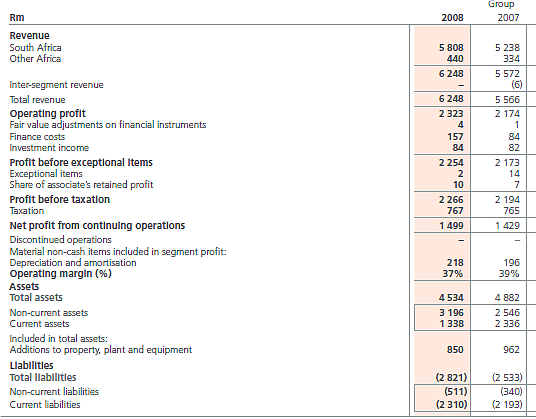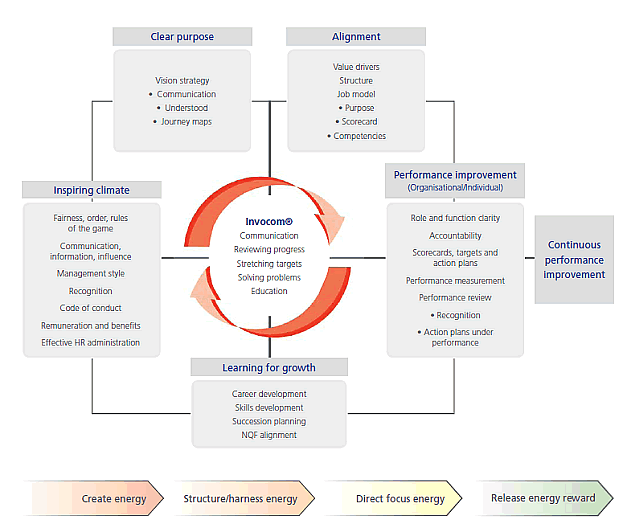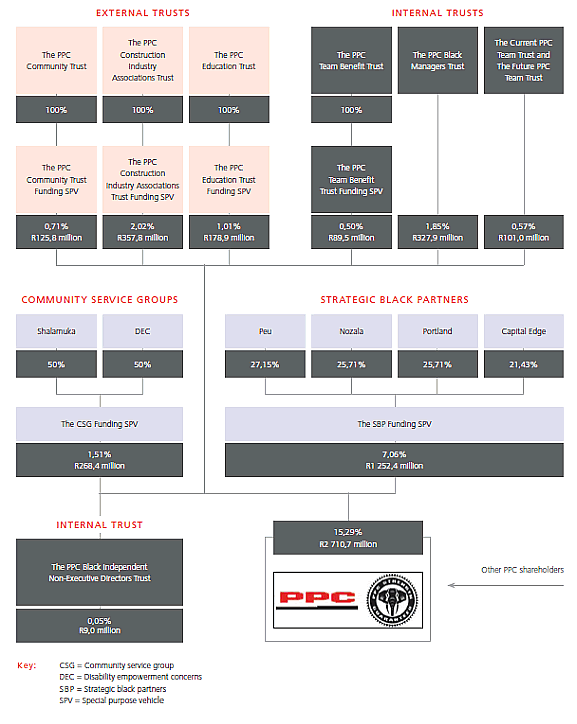 Pretoria Portland Cement Company Limited (PPC)
Pretoria Portland Cement Company Limited (PPC)
All data are collected in the Fiscal Year of 2008-2009.
Company Profile and History
Pretoria Portland Cement Company Limited, through its subsidiaries, engages in the production and sale of cement. It sells cement through its distribution network to the building and construction industry, concrete product manufacturers, and retail outlets, such as builders, merchants, hardware stores, and DIY centres. The company exports cement to other African countries and the Indian Ocean islands.
The company was founded in 1892. It was formerly known as De Eerste Cement Fabrieken Beperkt and changed its name to Pretoria Portland Cement Company Limited in 1908 and listed on the Johannesburg Stock Exchange in 1910.
PPC is the leading supplier of cement in Southern Africa, with eight manufacturing facilities and three milling depots in South Africa, Botswana and Zimbabwe. These facilities are capable of producing more than seven million tons of cement products each year.
PPC completed a R2,7-billion broad-based black economic empowerment transaction in 2008 which handed communities, construction industry associations, education trusts, community service groups (CSGs) and strategic black partners (SBPs) 15 percent of the ordinary share capital of the company. PPC’s employees, an educational trust, a construction industry trust and two CSGs received the largest portion of shares at 8,15 percent, while the SBPs, Nozala, Peu, iLima Portland Consortium and Capital Edge Cement Consortium, received 7 percent of the shares. In addition, the company established an internal trust for employees, black managers and non-executive directors which acquired 6,65 percent of PPC’s shares from existing shareholders. Bheki Sibiya was appointed as the first black chairman of PPC.
In Country Location
PPC Building, Barlow Park, 180 Katherine Street, Sandton;
Telephone: 00 27 (0)11 386 9000;
Fax: 00 27 (0)11 386 9001
Services and Products
Pretoria Portland Cement Company Limited, through its subsidiaries, engages in the production and sale of cement. The company markets cement under Surebuild brand in South Africa, Botcem brand in Botswana, and Unicem brand in Zimbabwe. The company also supplies metallurgical grade lime, burnt dolomite, limestone, and related products, as well as offers aggregates and sands.
Number of Employees
3,164 employees
Financial Information
Revenues up 12 percent to R6, 2 billion in 2008; Cash generated from operations up 16 percent to R2, 5 billion
Financial Summary


Market Share
PPC is Africa's biggest cement maker. PPC Lime is the leading supplier of metallurgical-grade lime, burnt dolomite, limestone and related products in southern Africa. It operates one of the largest lime plants in the world at Lime Acres in the Northern Cape, South Africa. PPC is also South Africa’s largest cement maker.
Business Objective
“Ensure cash flow returns that allow for continued reinvestment in and replacement of cement capacity; and continuously explore ways to reduce costs and improve efficiency of operations”
Business Model
The key elements of PPC’s strategy to realise its business objectives are is as follows: “Focus on core businesses; generate superior cash flow returns; achieve global competitiveness; develop globally competitive people; practice sound corporate, environmental and social governance; reduce energy cost by using substitute fuels; increase manufacturing capacity to meet the country's needs; and build on our strengths through synergistic growth.”
“Recognising that the future growth and success of the company are inextricably linked to its ability to grow and nurture the requisite skills, PPC has introduced a sixth vital element model. Under the mantra Learning for Growth, the company has introduced individual development plans, workplace skills plans, an operations academy, an academy for sales and marketing and other training related activities and programmes.”
The Vital Elements Of A Performing Organization - PPC

Ownership of Business


BEE Deal

Benefits Offered and Relations with Government
PPC sees the following as beneficial in its relationship with government: government has the political will to develop infrastructure & create jobs; government is targeting 4.5 percent to 6 percent GDP growth per annum (infrastructure led: > € 50 billion over 8 years); government is targeting Gross Fixed Capital Formation (GFCF) of 25 percent of GDP by 2014; low cost housing projects form the largest part of expected cement growth; 2010 Soccer World Cup will have a positive 3 year effect; and the reduction in both the corporate taxation and secondary tax on companies’ rates contributed R62 million to earnings in 2008.
The BEE Construction Sector Code presents the industry with the opportunity for the advancement of transformation and BEE in the procurement of construction programmes and services. The Code also seeks to regulate a target of 30% black ownership in the industry over the next 10 years.
In June 2009 the Competition Commission searched the offices of PPC, Lafarge Industries, the AfriSam Consortium, and Natal Portland Cement Cimpor as part of an investigation into anti-competitive conduct. The companies are accused of price fixing and market allocation, controlling or limiting the supply of cement extenders and abuse of dominance by PPC aimed at foreclosing independent cement blenders. The Commission said that despite fluctuations in demand and input costs, the producer prices of cement in South Africa have been increasing in tandem every six months, at levels far outstripping the producer price index - the leading indicator of overall costs in the economy. The producers have implemented increases of about 6 percent on average (12 percent a year) and an even higher increase in February 2009 in factory-gate, or producer prices.
Given the government’s substantial infrastructure investment, the Commission has been researching the infrastructure sector (one of its priority sectors) for two years and has identified a number of products where there may be competition concerns, including cement. Since the Commission began looking into infrastructure markets it has found evidence of price fixing, and customer and market allocation, as well as bid-rigging in the sector.
Product Development
PPC plans a new factory to replace its existing plant at Riebeeck West, which is now approaching 50 years of production. The new plant will not only replace existing capacity, but will extend the cement-manufacturing capacity in the Western Cape. The processing technology utilised in the new Riebeeck plant will be significantly more environmentally friendly and energy efficient than the current plant and will ensure the sustainable supply of cement to meet future demand in the Western Cape.
The Dwaalboom kiln 2 was successfully commissioned in September 2008. The Ntšhafatso new mill project at Hercules is progressing well and according to plan.




